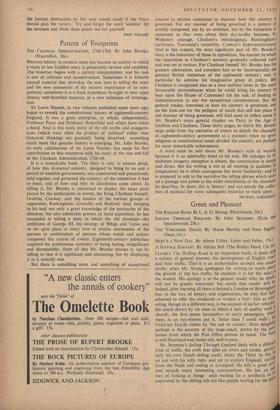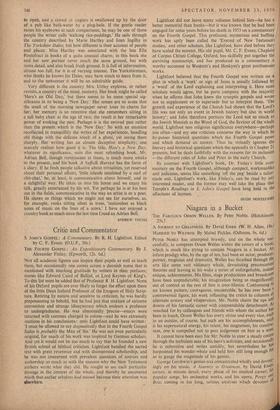Green and Pleasant
rid
th th
CLEARLY The Rolling Road is an important book; it deals WI a subject of general interest, the development of English roads
t
and their traffic. That it is an authoritative account one cantlo , doubt; when Mr. Strong apologises for writing so much abet' the growth of the bus traffic, he explains it is for the sake 0f the student. His apology is to the general reader who, he thiol‘s, will not be greatly interested; but surely that reader will he' Indeed, after learning all there is behind a London or Birmingharli bus, in the way of history and organisation, he may .feel half ashamed to offer the conductor so modest a fare! Just as inter' esting, though in a different way, is the account of earlier vehicles' the coach drawn by six oxen in which a lady of quality weet church; the first steam locomotive to carry passengers, wh hc went, as an eye-witness put it, 'faster than I could walk'; IV Victorian bicycle ridden by 'the cad on castors.' Most delightf perhaps is the account of the stage-coach, drawn by the post' horses from which the Post Office Flerives its name. The be
is well illustrated and, better still, well written. 10t
Mr. Seymour's Sailing Through England deals with a differ!
; :0'
kind of traffic, the craft that plies on rivers and canals, par1.1 larly his own Dutch sailing yacht, Jenny the Third. In this set out with his wife, baby and cat to explore England, start from the Wash and ending at Liverpool. He tells a good st°r and records many interesting conversations. He has an °d way of looking at things : seals waiting for a sandbank to uncovered by the ebbing tide are like people waiting for the !Ali to open, and a crowd of anglers is swallowed up by the door of a pub like bath-water by a plug-hole. If the gentle reader raises his eyebrows at such comparisons, he may be one of those people the writer calls 'walking rice-puddings.' He sails through the country described by Marie Hartley and Joan Ingilby in The Yorkshire Dales; but how different is their account of people and places. Miss Hartley was associated with the late Ella Pontefract in books of a quite unusual charm; in this book she and her new partner cover much the same ground, but with more detail, and also break fresh ground. It is full of information, almost too full, for it is of varying interest. The Yorkshireman, who thinks he knows his Dales, may have much to learn from it, and to the newcomer it will be an admirable guide.
Very different is the country Mrs. Uttley explores, or rather revisits, a country of the mind, memory. Her book might be called `Here's an Old Day,' but there seems to be some • special sig- nificance in its being a 'New Day.' Her senses are so acute that the smell of the morning newspaper never loses its charm for her; her memory is so retentive that she remembers sitting in a tall baby chair at the age of two; the result is her remarkable power of evoking the past. Perhaps it is the revived past rather than the present which is the `New Day.' So with an emotion recollected in tranquillity she writes of her experiences, handling old things with the delicate touch of a ghost, yet seeing them sharply. Her writing has an almost deceptive simplicity; one scarcely realises how good it is. The title, Here's a New Day, whatever its significance, suits this most refreshing book. Mr. Adrian Bell, though reminiscent at times, is much more awake to the present, and his book A Su/Jolk Harvest has the form of a diary, If he finds people talkative about trivialities, yet reserved about their personal affairs, 'little islands insulated by a surf of chit-chat,' he, at least, is communicative about himself, and in a delightful way. He takes us into his home and we enjoy his talk, greatly entertained by his wit. Yet perhaps he is at his best out in the fields, communicative in the way an artist is or a poet. He shows us things which we might not see for ourselves, as, for example, rooks sitting silent in trees, `motionless as black notes of music on the lines of a score.' I have not enjoyed a country book so much since the last time I read an Adrian Bell.
ANDREW YOUNG











































































 Previous page
Previous page